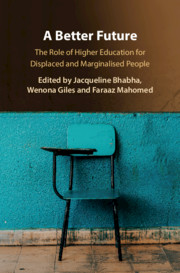Book contents
- A Better Future
- A Better Future
- Copyright page
- Contents
- Figures
- Tables
- Notes on Contributors
- Introduction
- Part I Encountering Marginalisation
- Chapter 1 Disparities in Participation in Higher Education among Migrants
- Chapter 2 Access to Higher Education and Retention of Students with a Migrant Background in the Netherlands
- Chapter 3 Roma in Higher Education
- Chapter 4 Higher Education in Exile
- Chapter 5 Continuing Inequalities in South African Higher Education
- Chapter 6 Inequities in US Higher Education Access and Success
- Chapter 7 Exploring Place
- Part II Deconstructing Marginalisation
- Part III Confronting Marginalisation
- Index
- References
Chapter 2 - Access to Higher Education and Retention of Students with a Migrant Background in the Netherlands
A Comparative Analysis
from Part I - Encountering Marginalisation
Published online by Cambridge University Press: 06 September 2020
- A Better Future
- A Better Future
- Copyright page
- Contents
- Figures
- Tables
- Notes on Contributors
- Introduction
- Part I Encountering Marginalisation
- Chapter 1 Disparities in Participation in Higher Education among Migrants
- Chapter 2 Access to Higher Education and Retention of Students with a Migrant Background in the Netherlands
- Chapter 3 Roma in Higher Education
- Chapter 4 Higher Education in Exile
- Chapter 5 Continuing Inequalities in South African Higher Education
- Chapter 6 Inequities in US Higher Education Access and Success
- Chapter 7 Exploring Place
- Part II Deconstructing Marginalisation
- Part III Confronting Marginalisation
- Index
- References
Summary
This chapter looks at access to and retention in higher education of children of migrants with low levels of education across a number of Western European countries, using data of the Integration of the European Second Generation (TIES) survey. The comparative perspective shows the impact of national institutional arrangements on education. Access to and retention in higher education of children of migrants with low levels of education still show considerable gaps when compared to those of peers of native descent. Data analysis shows that socio-economic background characteristics or the migrant background is only partly responsible for the gaps between students with and without a migrant background. We zoom in on students of Turkish descent in the Dutch school system to analyse whether these gaps are the result of socio-cultural background characteristics related to their ethnic group or migration (their own or that of their parents) or whether the gap in educational outcomes can be explained by how educational institutions provide opportunities or, on the contrary, fail to cater for children of immigrants. Based on detailed information available in the Netherlands, we show how differences in the preparation for higher education that students get can lead to important differences in study success later on.
Keywords
- Type
- Chapter
- Information
- A Better FutureThe Role of Higher Education for Displaced and Marginalised People, pp. 40 - 58Publisher: Cambridge University PressPrint publication year: 2020
References
- 1
- Cited by

